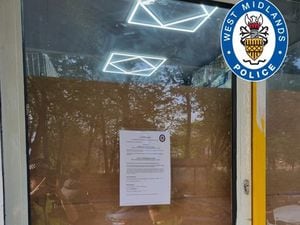Walsall woman who turned six-bed house into cannabis farm may have to sell home to avoid jail
A Walsall businesswoman and professional gambler may have to sell her home to pay a confiscation order after she financed the setting up of a cannabis operation in a rented farmhouse.

Lisa Scotney, 56, of Broadway North, narrowly escaped jail after she pleaded guilty to conspiring to produce cannabis at a Solihull farmhouse two years ago.
Now she's been ordered to pay back more than £190,000 she was deemed to have made from the drugs farm.
Judge Peter Cooke ruled that Scotney had benefited to the tune of £190,944 from the illegal activity and order for the full amount to be confiscated after hearing that she had assets totalling £406,912 including her home, which she may have to sell to make the payment.
Judge Cooke ordered her to pay the money within three months or face two years in prison.
In 2019 she was given a two-year prison sentence, suspended for two years for the sake of her children, and ordered to do 240 hours of unpaid work.
On that occasion a confiscation hearing against her and one of her accomplices, Shaun Wilkinson, under the Proceeds of Crime Act was adjourned for an investigation into their finances.
Following a series of adjournments, Judge Peter Cooke was told that figures had finally been agreed.
Wilkinson, 51, of City Heights, Snow Hill, Birmingham, who had been given an 18-month suspended sentence and was also ordered to do 240 hours of unpaid work, was said to have had a benefit of £125,627 from the conspiracy.
But his assets were assessed at just £30 which he was ordered to pay within 28 days, with seven days prison in default.
During the original hearing, prosecutor Tariq Shakoor said Scotney financed the cannabis operation at Heathfield Farm in Hockley Heath, near Solihull, and she and Wilkinson played significant parts in organising it.

A third defendant, Edward Ambrozewicz, 57, of Roebuck Glade, Willenhall, who was sentenced to 21 months suspended for two years, was recruited because of his expertise in growing cannabis.
The farm was a six-bedroom luxury house with electronic gates, 11 acres of grounds, an indoor swimming pool and a gym.
A letting agency was contacted in July 2016 by Wilkinson and a rent of £3,750 a month was agreed, with a deposit of £4,250.
“From that date, or very soon after, the production of cannabis was taking place,” said Mr Shakoor.
All three were at the farmhouse when the police raided it in March 2017, forcing their way through the gates.
In the garage were 40 plants about ten weeks from being ready to harvest and 21 root balls from a previous crop, as well as heating and lighting equipment and bags of fertiliser.
In the gym were 11 plants which were just six weeks away from harvest, while a bedroom in the annexe housed seven large plants and 26 small plants in propagators.
A first-floor kitchen had five plants, a quantity of cannabis waste from previous harvests, and a shredding machine.
Bedroom five had a tent with five plants in it, while an upstairs sitting room contained a further 13 plants, and a bathroom was being used for storing the growing chemicals.
Based on commercial supply in one-ounce deals, the cannabis ready for sale and the plants approaching harvest would have been worth around £33,000 - with further crops on the way.
“Shaun Wilkinson was living there. It seems Lisa Scotney was spending quite a bit of time there, and Ambrozewicz, someone who is experienced in growing cannabis, was visiting regularly.”
At Scotney’s home the police found a detailed list of items needed to set up a cannabis grow, and ‘significant sums of money’ were passing from her account.
Wilkinson had received £73,135 from her which, although not necessarily all relating to drugs, included £3,750 a month for the rent which he then paid to the rental agency.
Sentencing them, Recorder Kenneth Carr had told Scotney and Wilkinson: “Both of you were intimately involved in the setting up of this operation and in the day-to-day running of it.
“This was a thoroughly criminal course which you both enthusiastically joined in. You both played leading roles.”





